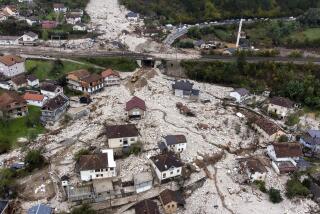Yugoslav Army ‘Cowardly,’ EC Report Says : Conflict: Monitors suggest Western intervention to protect civilians from troops.
- Share via
BELGRADE, Yugoslavia — Western countries should consider sending troops and arms to Yugoslavia to strike at the “cowardly” federal army that has terrorized civilians across Croatia, European Community monitors recommended in an unusually critical report disclosed here Tuesday.
The call for Western military intervention came a day after the 12-nation bloc targeted Serbia and Montenegro for sanctions, saddling the two republics with the heaviest share of blame for the Yugoslav war.
Although intended to deter further fighting, Western European attempts to isolate Serbia and frighten the army could serve to sharpen hostilities between the warring factions. Serbia contends the conflict has been instigated by foreign powers aiding Croatia and, along with the army, has vowed to liquidate any unwanted intervention force.
Belgrade leaders have called for U.N. peacekeeping troops along the current battle lines to stop the Serb-Croat fighting, which has continued in eastern Croatia despite a 14th cease-fire declared by foreign mediators more than a week ago.
U.N. special envoy Cyrus R. Vance, visiting Yugoslavia to assess the combatants’ sincerity in appealing for U.N. intervention, traveled in an armored personnel carrier to the scene of the most recent battles around the city of Osijek. Belgrade Radio said he also visited the village of Dalj about 15 miles farther east along the Danube River. But the broadcast gave no other details of his trip under federal army escort into occupied Croatia.
The Serbian-commanded army has captured about a third of Croatian territory, including most of the fertile region around Osijek. From Serbian-held villages just across the Drava River, the army’s heavy guns could be heard pounding Osijek through the previous night, falling silent just before Vance arrived.
In one sign of diminishing conflict, Zagreb Radio quoted republic maritime officials as saying a three-week blockade of Adriatic ports had been lifted by the federal navy, except around the resort city of Dubrovnik.
Indiscriminate shelling by federal soldiers to subjugate Croatian strongholds, like Osijek and nearby Vukovar, has inflicted thousands of deaths, many of them among civilians. At least 7,000 have been killed in five months of war and 500,000 have been driven from their homes.
In a report to European Community headquarters in Brussels, monitors who have spent months trying to mediate the crisis lashed out at the army for striking “purely civilian targets with random fire” and accused the federal troops of deliberately aiming at churches, schools and hospitals.
“Throughout broad areas of territory in innumerable smaller villages, Croatian inhabitants are killed or forced to leave after which their villages are bulldozed out of existence,” the Zagreb-based monitors reported. “In the last analysis (the Yugoslav People’s Army) is a cowardly army, fighting for no recognizable principle, but largely, instinctively, for its own status and survival.”
The report said the EC monitoring team is powerless to stop the fighting and called for foreign military assistance to confront the army with an equal level of force, “to intimidate and hit it in places where it hurts.”
Serbs, who make up about 12% of Croatia’s 5 million citizens, claim Croatian secession would expose them to persecution. They fear a repeat of atrocities committed by Croatian fascists during World War II, when hundreds of thousands of Serbs were slaughtered in a bloody civil war that raged during the Nazi occupation. Croatia accuses Serbia of trying to seize as much Croatian territory as possible to create a Greater Serbia from the remnants of Yugoslavia.
Serbia’s state-controlled media branded the EC decision Monday to continue economic sanctions against only Serbia and Montenegro as “interference” in Yugoslavia’s domestic affairs. After disclosure of the monitors’ report, Belgrade warned that any uninvited foreign military force would be viewed as aggressive and would be dealt with accordingly.
More to Read
Sign up for Essential California
The most important California stories and recommendations in your inbox every morning.
You may occasionally receive promotional content from the Los Angeles Times.











